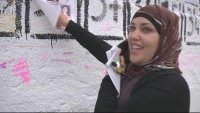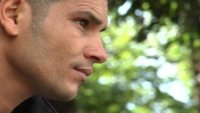News, October 2011
www.aljazeerah.info
Archives
Mission & Name
Conflict Terminology
Editorials
Gaza Holocaust
Gulf War
Isdood
Islam
News
News Photos
Opinion Editorials
US Foreign Policy (Dr. El-Najjar's Articles)
|
Editorial Note: The following news reports are summaries from original sources. They may also include corrections of Arabic names and political terminology. Comments are in parentheses. |
Tunisian election officials counted the votes on Monday in the country's first free election since the popular uprising in January that toppled the Ben Ali regime and kickstarted the Arab Spring.
REUTERS - Tunisian election officials counted the votes on Monday after the country’s first free election, 10 months on from the moment Mohamed Bouazizi set himself on fire in a protest that started the Arab Spring uprisings.
Most forecasts point to a moderate Islamist party emerging with the biggest share of the vote, an outcome that worries secularists and could be replicated in other Arab states when they hold their own post-Arab Spring elections.
Turnout in the vote, for an assembly which will sit for one year and draft a new constitution, was more than 90 percent—a mark of Tunisians’ determination to exercise their new democratic rights after decades of repression.
U.S. President Barack Obama said Tunisia’s revolution in January, which began with Bouazizi and ended with autocratic President Zine Al-Abidine Ben Ali fleeing abroad, had “changed the course of history.”
“Just as so many Tunisian citizens protested peacefully in streets and squares to claim their rights, today they stood in lines and cast their votes to determine their own future,” he said in a statement issued by the White House.
The suicide of vegetable peddler Bouazizi, prompted by despair over poverty and government harassment, provoked mass protests which ended Ben Ali’s 23-year grip on power.
This in turn inspired uprisings in Egypt, Libya, Yemen, Syria and Bahrain which have re-shaped the political landscape of the Middle East and North Africa.
With an unexpectedly large number of ballot papers to count, election officials said it was likely to be Monday or even later before they have results to announce.
State radio reported that incomplete counts in two provincial cities, Sfax and Kef, had the Islamist Ennahda party in the lead. The Congress for the Republic, a leftist secular party, was in second place in Sfax and Ettakatol, another socialist group, was runner-up in Kef, the radio said.
Ennahda, citing its own, unofficial tally from votes cast by the large Tunisian diaspora, said indications were that it had done well. Overseas voting was held days before Sunday’s election.
“Ennahda was first in all the foreign polling stations,” its campaign manager, Abdelhamid Jlazzi, told a gathering of party workers. “We got more than 50 percent.”
Ennahda’s fortunes may have a bearing on Egyptian elections set for next month in which the Muslim Brotherhood, an ideological ally, also hopes to emerge strongest.
Contradictions
The 217-seat assembly Tunisians are electing will, as well as re-writing the constitution, choose a new interim government and set dates for parliamentary and presidential elections.
Western diplomats say Ennahda is unlikely to win a majority of seats in the assembly in its own right, forcing it to make alliances with secularist parties and therefore diluting its influence.
Ennahda’s leader Rachid Ghannouchi, who spent 22 years in exile in Britain, models his party on the moderate Islamist rule of Turkish Prime Minister Tayyip Erdogan.
He says his party will respect women’s rights and not try to enforce any personal morality code on Tunisians.
But the prospect of it winning a share of power still makes some people feel uncomfortable in Tunisia. It has secular traditions which go back to its first president after independence from France. He called the hijab, or Islamic head scarf, an “odious rag.”
When Ghannouchi emerged from the polling station where he cast his vote on Sunday, about a dozen secularists shouted at him: “Degage”, French for “Go away”, and “You are a terrorist and an assassin! Go back to London!”
“I’m not so optimistic about the result of the vote,” said Ziyed Tijiani, a 26-year-old architect after he cast his ballot on Sunday.
“I think the Islamists could win. It’s not want I want. They may try to change the way I live,” he said, accompanied by a young woman in jeans and T-shirt.
Across the country on Sunday, queues stretching hundreds of metres long formed outside polling stations from early in the morning for an election which could set the template for other states emerging from the Arab Spring.
“This is the first time I have voted,” said Karima Ben Salem, 45, at a polling station in the Lafayette area of Tunis.
“I’ve asked the boys to make their own lunch. I don’t care ... Today I am not on duty. Or rather, I am on duty for my country,” she said.
An Ennahda victory would be the first such success in the Arab world since Hamas won a 2006 Palestinian vote. Islamists won a 1991 election in Algeria, Tunisia’s neighbour, but the army annulled the result, provoking years of conflict.
Tunisia has a tiny minority of hardline Islamists, but the policies Ennahda espouses are more in keeping with mainstream Tunisia, where most people take a laid-back view of Islam’s strictures on things like drinking alcohol.
“This morning I voted for Ennahda and this evening I am going to drink a few beers,” said Makram, a young man from the working class Ettadamen neighbourhood of Tunis.
Yet observers say there is tension inside the party between Ghannouchi’s moderate line and more vehement Islamists among the rank and file.
A final election rally on Friday illustrated the party’s contradictions as Suad Abdel-Rahim, a tall, glamorous female Ennahda candidate who does not wear a veil, addressed the crowd.
But many books on sale on the fringes of the rally were by
writers who belong to the strict Salafist branch of Islam. They
believe women should be segregated from men in public and that
elections are un-Islamic.

Fair Use Notice
This site contains copyrighted material the use of which has not always been specifically authorized by the copyright owner. We are making such material available in our efforts to advance understanding of environmental, political, human rights, economic, democracy, scientific, and social justice issues, etc. We believe this constitutes a 'fair use' of any such copyrighted material as provided for in section 107 of the US Copyright Law. In accordance with Title 17 U.S.C. Section 107, the material on this site is distributed without profit to those who have expressed a prior interest in receiving the included information for research and educational purposes. For more information go to: http://www.law.cornell.edu/uscode/17/107.shtml. If you wish to use copyrighted material from this site for purposes of your own that go beyond 'fair use', you must obtain permission from the copyright owner.
|
|
|
|
||
|
||||||





